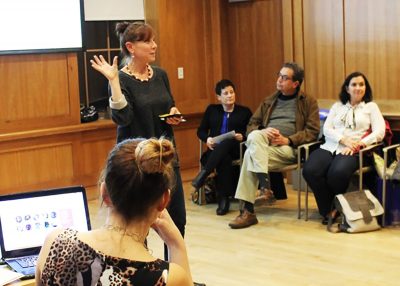
The Cambridge City Hall Annex buzzed with chatter and was lined with seats facing a large projection screen on Thursday. A crowd of around 35 people gathered to watch a unique project created by Transition House.
Transition House is an emergency shelter and resource to help those experiencing domestic violence in their homes. It offers “support and services to survivors of domestic violence … including partner abuse, dating violence and family violence,” according to a pamphlet. The Transition House opened in 1975 and just celebrated 40 years of serving those in need in the Cambridge community.
To mark the achievement of being open and evolving for 40 years, the Transition House has been working on a project it calls 40 Stories, which is a compilation of two- to three-minute videos of people who have been affected by the Transition House. The participants include women who lived there and are now working for the organization, as well as adults who lived there when they were children.
Currently, there are 14 videos up on the website that can be viewed by the public. The creative team working on the project is still filming and editing more interviews, which will be sent out to the public in small batches over the course of 2017.
Sandy Goldberg, the creative director of the 40 Stories project, said the creation of the videos is a long process, and they “wanted to use pictures over storytelling because of the sensitivity of the subject.”
The videos dive into personal stories about experiences at Transition House, the evolution and growth of the organization and why it is important and necessary for the community.
“They were conversational, very relaxed and you get to see people from all different walks of life and how their lives have been affected by Transition House,” said Jasmine Khalfani, 63, of Medford, about the videos.
One video is of Cambridge Police Department Detective Christopher Borum and his personal connection to the Transition House. When he was a child, he lived in the Transition House shelter with his mother and sister after they left his abusive father. Borum described how they arrived at the Transition House with their belongings in trash bags and lived there until his mother eventually got a job and a degree, and they were able to afford their own apartment.
“I’ve seen how far it’s come and I’m pretty impressed,” Borum said.
This viewing of the first 14 videos was a sort of open discussion for the creative team to get feedback from the community. The viewers gave advice on what types of thumbnails should be displayed, the types of people they would like to see in interviews and how to make the videos more shareable on social media.
Risa Mednick, the executive director of Transition House, described the relationship the Transition House has with the Cambridge Police Department and how they have collaborated to make large efforts and strides in the Cambridge community.
Because domestic violence is often treated as a private topic, confidentiality is an extremely important part of their work; the police department helps keep their victims safe, she said.
“You look at what their lives could be like if they sought out help,” Mednick said.
Mednick emphasized that Transition House is working to promote hope for victims. The 40 Stories project not only brings awareness to the issue of domestic violence, but it also shows how individuals and families who experienced domestic violence can escape and succeed in life. She said that the future treatment of domestic violence issues in the Cambridge community is one of the main reasons for the 40 Stories project.
“We want to change how we as a community go about addressing domestic violence,” she said.

